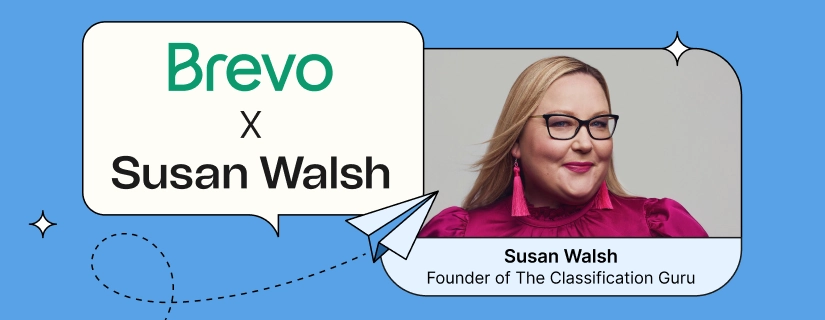Businesses rely on data for everything—from customer engagement to operations. However, “dirty data”—which is inaccurate, inconsistent, or incomplete—can lead to costly mistakes, lost revenue, and missed opportunities.
We sat down with Susan Walsh, founder of The Classification Guru and one of the influential voices featured on Brevo’s Top 100 Customer Engagement Influencers to Watch in 2025 to discuss the common pitfalls businesses face with data management.
In this exclusive interview, she shares her framework for data quality and practical steps businesses can take to ensure clean and trustworthy data.
Check it out here:
Key takeaways:
1. A simple framework for better data management: The COAT method
Many businesses struggle with messy, inconsistent, and siloed data. To help companies tackle this, Susan developed the COAT framework—a simple yet effective approach to ensuring data quality.
"I came up with COAT because data problems are people problems. A lot of the people who create incorrect data are not data professionals. So, we need a framework that everybody can understand."
What is COAT?
- Consistent – Standardize data formats, naming conventions, and units of measurement.
- Organized – Structure data to make it easy to retrieve and analyze.
- Accurate – Define and enforce quality standards to ensure reliable data.
- Trustworthy – Consistent, organized, and accurate data naturally becomes trustworthy.
Why it matters:
Without a structured approach to data management, businesses risk making decisions based on incorrect information, leading to operational inefficiencies and financial losses. Applying the COAT framework can help organizations clean up their data, improve reporting accuracy, and build trust in their insights.
Brevo’s Customer Data Platform (CDP) helps you organize and consolidate customer data from various sources. Be it data from in-store and online purchases, website browsing behavior, app usage, or phone complaints, a CDP standardizes this data and brings it together in one central platform, eliminating data silos.
2. AI is changing the future of data management
As businesses adopt AI-powered tools, the accuracy of the data feeding into these systems is critical. AI is only as good as the data it learns from.
"We've seen this with a number of different technologies over the years. Do you remember when OCR and document scanning came in, and everyone was like, 'It's going to take over our jobs.' And, actually, it did the stuff that we didn't want to do anyway."
Rather than replacing jobs, AI enhances productivity by automating repetitive tasks, allowing data teams to focus on higher-value work. However, AI cannot correct messy data independently—it needs clean, structured, and well-maintained data to function effectively.
3. Why data integrity is a business-wide responsibility
Many organizations treat data quality as an IT issue, but Susan emphasizes that data integrity is everyone’s responsibility.
"It takes a village, as they say. It’s not one person’s responsibility. Data is not just the IT or data department's problem—it’s everybody’s problem and responsibility."
What businesses should do:
- Educate teams on why data accuracy matters
- Assign internal data champions across departments
- Regularly audit and clean databases to prevent long-term issues
Bottom line: Organizations that prioritize data quality across all teams will see better customer insights, improved efficiency, and stronger business performance.
Further reading: 9 CDP Use Cases for Retailers
Final thoughts: the key to better data management
Data is one of your company’s most valuable assets—but only if it’s accurate, organized, and trustworthy. Whether adopting AI, optimizing marketing campaigns, or making strategic decisions, dirty data will always hold you back.
By implementing best practices like the COAT framework, leveraging AI strategically, and making data quality a company-wide priority, businesses can unlock the full power of their data and gain a competitive edge.
Want to learn more? See who else made Brevo’s Top 100 Customer Engagement Influencers to Watch in 2025







